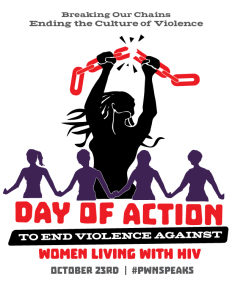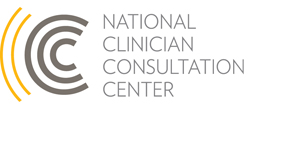National Day of Action to End Violence Against Women Living with HIV 2016
The National Day of Action to End Violence Against Women Living with HIV, on October 23rd, serves as a reminder that complex medical conditions, such as HIV and substance use, are often connected to public health issues like trauma and violence. Ending the culture of violence is crucial to ending HIV transmission, HIV-related morbidity and mortality, and stigma.
 Violence can be both a risk factor for acquiring HIV, and a consequence of living with HIV. Women living with HIV (WLHIV) experience higher rates of sexual assault, intimate partner violence, childhood sexual abuse, and overall trauma, compared to the general population. In addition to interpersonal violence, WLHIV experience considerable community and institutional violence. Some women –women of color, young women, low-income women, and transgender women, among others– are especially vulnerable to trauma, violence, and acquiring HIV.
Violence can be both a risk factor for acquiring HIV, and a consequence of living with HIV. Women living with HIV (WLHIV) experience higher rates of sexual assault, intimate partner violence, childhood sexual abuse, and overall trauma, compared to the general population. In addition to interpersonal violence, WLHIV experience considerable community and institutional violence. Some women –women of color, young women, low-income women, and transgender women, among others– are especially vulnerable to trauma, violence, and acquiring HIV.
Trauma and violence affect HIV health care encounters, as recent experiences of abuse may lead to reduced care linkage and engagement in medical care, as well as challenges with medication adherence. To learn more and take action to end violence against women living with HIV, see the following resources:
- National Day of Action to End Violence Against Women Living with HIV site (Positive Women’s Network USA)
- United to End HIV Stigma Initiative (HIVE): “HIV #LanguageMatters: Addressing Stigma by Using Preferred Language”
- Intersection of Intimate Partner Violence and HIV in Women (CDC)
- Guidelines for the Primary and Gender-Affirming Care of Transgender and Gender Nonbinary People: Transgender Health and HIV (Center of Excellence for Transgender Health, UCSF)
- Machtinger EL, Cuca YP, Khanna N, Rose CD, Kimberg LS. From treatment to healing: the promise of trauma-informed primary care. Women’s Health Issues. 2015 May 1; 25(3): 193-7. (Women’s HIV Program at UCSF)
The Clinician Consultation Center (CCC) supports efforts to raise awareness about issues impacting women living with, and at risk for, HIV. The CCC provides personalized guidance and unique resources to clinicians working to provide the best possible care for women at risk of acquiring HIV or living with HIV. To read more about our rapid expert consultation services, visit our site.
 University of California, San Francisco |
University of California, San Francisco |
